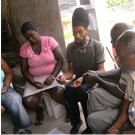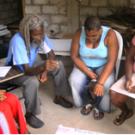Brenda Wilson (Saint Lucia), has been working for the past four months on a project in the community of La Pointe, Micoud, St. Lucia. 25 households are low income from crops and produce due to changes in the weather patterns bringing extreme weather events such as hurricanes, and an increasingly unpredictable beginning and end to rainy season.
These challenges affect the organization and its members in their active involvement in developing successful agri-business to meet the needs of families and the wider community. This inhibits their ability to obtain more secure land tenure and the development of the organization to make a more significant contribution in alleviating situations of hardship encountered by the community, increasing awareness of the benefits of agri-business as well, as well as the impact of poor environmental practices on the community.
| Participatory Needs Assessment |
|
 |
After conducting a participatory needs assessment with the community members of La Pointe, Brenda developed this project outline to increase crop production, reduce malnutrition and improve food security and reduced mortality rates among children and the community. |
|
Their simple project outline: [Problem 1] Low income from crops and produce Climate Smart Agricultural Practices Programme [solution to underlying cause: changes in the weather patterns springing extreme weather events such as hurricanes, and an increasingly unpredictable beginning and end to the rainy season]:[Activity 1]: Surveys and interviews to collect traditional knowledge on agriculture, changes in agricultural cycles, vulnerabilities and coping strategies |
|
| Project Goals: | |
 |
Brenda’s project goals are to let the community members of La Pointe be able to enjoy obtain improved incomes from greater market access for products and produce and through a climate smart agricultural practices program aimed at reducing the impacts of changes in weather patterns. |
These solutions will enhance the development of the organization and its members in their active involvement by developing successful agri-business to meet the needs of families and the wider community, provide opportunities to obtain more secure land tenure, improve the capacity of the organization to contribute significantly towards alleviating situations of hardship encountered by the community, increase public awareness of the benefits of agri-business as well as having positive impact on good environmental practices within the community.
You can download the participatory needs assessment with photos for her project here:
OL 341 Assignment One.
You can download her full project outline here:
OL 341 Assignment Two.
You can download Brenda’s compelling two-page fact sheet here:
OL 342 Assignment Five.
Would you like to learn how to develop Community Based Adaptation Projects?
Please write us with your stories, thoughts and comments through Online.Learning@csd-i.org